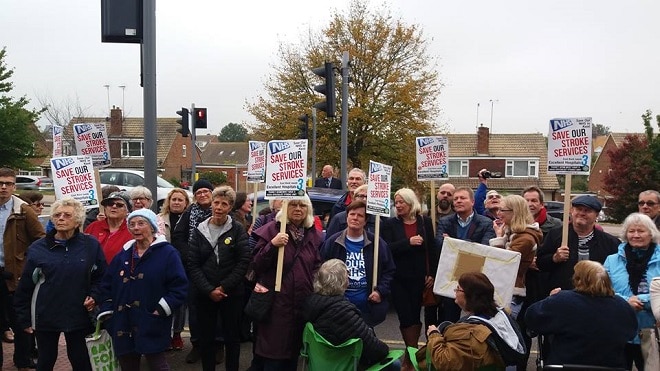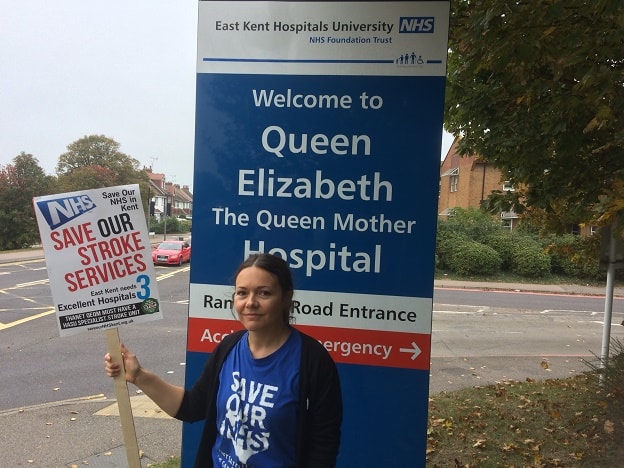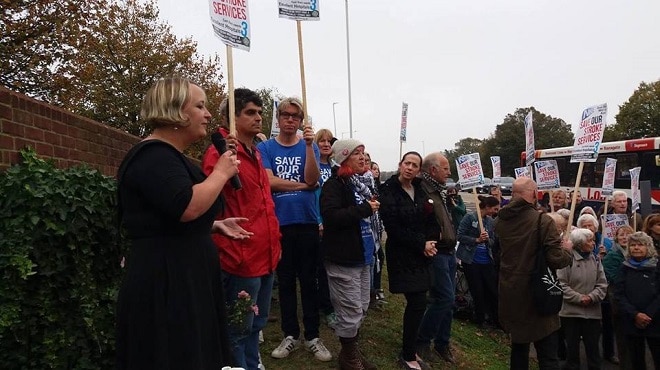
Members of campaign group Save Our NHS in Kent (SONiK) will hold a protest next week as the Joint Committee of Clinical Commissioning Groups meet to confirm a final decision on overhauling acute stroke services across the area.
The proposals will mean the closure of QEQM Hospital’s acute stroke service, amongst others, in favour of a hyper-acute unit in Ashford.
Hyper acute stroke units have a multi-disciplinary team of specialist stroke clinicians, seven days a week to care for people in the first 72 hours after a stroke.
A final decision on the location for three units across Kent & Medway is expected to be confirmed by the Joint Committee of Clinical Commissioning Groups on February 14 during a meeting in public at the Hilton Hotel, Maidstone.
The proposed shortlist for three hyper-acute stroke units was announced at the start of last year. The preferred option was then confirmed in September as Darent Valley Hospital, Maidstone Hospital and William Harvey Hospital.
But the number of public spaces to attend the meeting was limited and has already sold out.
Campaigners are demanding a new location is found to accommodate more members of the public.

Carly Jeffrey (pictured), from SONiK, questioned why a hotel is being used for the meeting rather than Maidstone’s County Hall. She added: “The NHS belongs to the public, and the NHS constitution states that the public will be involved in decisions made about the service. This is completely unacceptable.”
Former South Thanet parliamentary hopeful Rebbecca Gordon-Nesbitt branded the limited public space as “a travesty.”
The Kent & Medway NHS Trust says this is a meeting in public rather than a public meeting, stating: “A meeting in public is where members of the public can attend to observe a formal meeting of a committee or board. However, observers are not permitted to join in the discussion.
“It is different from a public meeting; which is an open forum to allow members of the public to ask questions and discuss issues with members of the NHS in Kent and Medway – usually on a specific topic.”
Audio from the meeting will be live streamed on the Kent and Medway NHS Trust website.
Reorganising the service
Darent Valley will have a 34 bed unit, Maidstone General Hospital will have 38 beds and William Harvey Hospital will have 52 beds. There will also be a two bed outflow at Eastbourne General Hospital.
There will be no acute stroke services at Medway Hospital, Tunbridge Wells Hospital, Margate’s Queen Elizabeth the Queen Mother Hospital and Kent & Canterbury Hospital – which has already had its service withdrawn due to the removal of training doctors by Health Education England in March 2017
The JCCG say there will be an increase in specialist stroke staff including an estimated 8.8 additional consultants, up to 107 additional nurses and 46 additional physiotherapists and occupational therapists.
It expects the hyper-acute units at Darent Valley and Maidstone to go live in March 2020 followed by the William Harvey Hospital in spring 2021.
Thanet campaign

Thanet campaigners have been fighting the proposals, saying isle lives will be at risk because of the journey times to Ashford which can take more than one hour from the isle.
Calls have been made by the Save Our NHS in Kent group for the Kent and Medway NHS to look at the proposals again to include a fourth HASU unit at the QEQM.
MP Craig Mackinlay has also called for a fourth unit at QEQM. Cllr Constantine has been among those calling for the MP to again raise the issue publicly and in Parliament.
JCCG report
The JCCG report says East Kent Hospitals University NHS Foundation Trust (EKHUFT) concluded that it would not be possible to run two Hyper Acute Stroke Units in east Kent because it would be very difficult to deliver due to recruitment issues and the risks around staff relocation. Of the sites run by the trust (QEQM, William Harvey and Canterbury), the William Harvey Hospital was identified as the best option for a hyper acute stroke unit
The JCCG stroke report says: “Some patients will have to travel further for the urgent aspects of their stroke care, with the maximum journey time being 63 minutes however, consolidating hospital stroke services will save lives and reduce disability.
“People from the most deprived quintile will be disproportionally impacted by the proposed changes in terms of travel and access, compared to the general population. However, the positive health impacts from the proposed changes, including improved clinical outcomes, are likely to also be experienced disproportionately by this group due to their higher likelihood to require stroke services.
“Therefore, the impact of increased travel times will be felt by visitors and carers who will need to travel further to visit patients, and mitigations are being developed to address this issue via a Travel Advisory Group.”
Funding
It is planned provide additional funding of £500,000 per year for the ambulance service which will ‘upskill’ paramedics.
The report adds that the units will reduce financial deficits in the Kent and Medway service, although a review of those finances will take place.
An estimated £13.6m was spent by CCGs on acute stroke activity in the Kent and Medway catchment area in 2016/17. Hospital stroke services are currently running at an estimated £7.5 million deficit. The new service would decrease that deficit by £0.5m
The cost to CCGs of implementing the new hospital stroke service model has been estimated at £3m per year :
- An estimated £1.7m, comprising the costs of re-training the work force, double running, excess travel and agency premium to continue services on those sites set to cease services.
- An estimated £1.6m costs for agency premium to continue services on those sites set to cease services.
- A proposed annual £0.5m (full year effect) increase in ambulance costs reflecting the impact of the increase in ambulance mileage.
- Plus a £3.3m for programme management costs to implement the changes and three years for the renting of a modular building in Dartford
These costs are in addition to a total capital investment of £27.7million
The JCCG also say current units are understaffed with QEQM having a shortfall of 4 specialist consultants
Stroke prevalence across the Kent and Medway CCGs is around the national average of 1.7% but In Thanet has the highest prevalence in the county at 2.1% followed by Canterbury at 1.9%. In Kent and Medway there were 3,146 confirmed strokes in 2016-17 with 372 of those logged in the Thanet area.
The decision meeting and protest
The stroke services meeting on February 14 will be held at 2pm at the Hilton Hotel, Maidstone.
SONiK will hold a protest outside the meeting venue from 1pm.
To register your comments about the stroke unit plans email [email protected]


Journey times to Ashford are inaccurate – anyone who has to travel to Ashford regularly knows that it can take 1.5 – 2 hours at peak times. Around an hour is hardly ever possible, and if a no-deal Brexit happens the roads leading to the William Harvey from Thanet will be clogged with lorries.
It is also shameful that there are so few public places for the public to attend this meeting that they are already sold out.
No matter how much is spent on upgrading the ambulances and personnel skills they will still get stuck in the regular traffic jams unless they are fitted with wings.